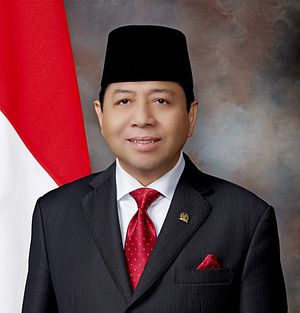The latest chapter in an all-consuming corruption case in Indonesia threatens to engulf party politics and the House of Representatives (DPR) for weeks after the arrest of Setya Novanto led to his resignation as both speaker of the House and chairman of the Golkar party. Novanto faces corruption charges for his alleged role in a wide-spread graft scheme targeting the e-KTP scheme, a mammoth infrastructure project to update the identification cards of Indonesian citizens, which is believed to have seen millions funneled out of the public coffers into the pockets of around 100 public officials.
Despite the support Novanto had enjoyed from his party during many of his earlier scandals, and indeed until the writing was on the wall in the e-KTP case, his position as leader of Golkar had become untenable forcing an emergency party meeting in mid-December.
Novanto had finally faced the Jakarta Anti-Corruption Court on Wednesday, December 13, after a series of increasingly absurd reasons for dodging previous orders to appear. While refusing to respond to questioning and claiming to be suffering a bout of diarrhea, Golkar leadership was scrambling to replace the tainted soon-to-be-former leader, with a fierce 2019 election season expected to begin in the early months of 2018 underscoring the urgency.
Previously seen as a kingmaker in electoral politics, the influence of Golkar has slowly waned in recent years after backing presidential challenger Prabowo Subianto in his failed bid against Widodo in 2014. Novanto is credited with shifting Golkar into the government alliance, but there is now an emerging view the party throws its weight behind a likely winner, rather than turn a preferred candidate victorious through its mighty support.
Late that Wednesday night, Airlangga Hartarto was announced the new leader of Golkar. As the current Minister for Industry and a longtime party stalwart, Hartarto is uniquely positioned to right the ship Novanto had aggressively steered off course. Named as a minister in President Joko Widodo’s cabinet during a mid-2016 reshuffle, Hartarto is believed to be somewhat close with the president and far less of a liability to him.
Hartarto has a big job ahead of him repairing the Golkar brand after the corruption reckoning and must do so quickly if it hopes to carry the same weight in 2019 as it has for decades. While Golkar remains one of the largest parties, the party was slow to purge Novanto from its ranks despite an obvious widespread distrust of him across the electorate. This type of extreme degree of being out-of-touch with voters will likely leave the party to continue its trajectory of losing more and more seats each election season if not remedied.
Novanto had earlier that week sent a letter to Golkar leadership asking Aziz Syamsuddin to replace him as both Golkar chair and speaker of the House. Syamsuddin missed out on the chairmanship and is one of three names put forward by Golkar to lead the House. His courteous loss, telling Kompas he was more than happy to support Hartarto as leader, signaled unity within the party as he listed off the challenges in the 18 months ahead.
In a case of deja vu for Deputy Speaker Fadli Zon, who acted as Speaker in late 2015 following Novanto’s embroilment in another corruption case regarding mining giant Freeport-McMoRan, he is again acting in the role until Novanto is formally replaced. While the Indonesian Democratic Party of Struggle (PDI-P), as the largest party in the current parliament, has the final say on who the next speaker of the House of Representatives will be Golkar is keen to retain the prominent position.
The House will reopen January 8 and deliberations on the new speaker will begin immediately, with Syamsuddin facing off against Agus Gumiwang Kartasasmita and Bambang Soesatyo for the Golkar nomination.
Meanwhile, the court hearing against Novanto will reopen this week with the Corruption Eradication Commission (KPK) slated to respond to Novanto’s legal team’s arguments. Novanto had been warned by the court he faced a possible increase in jail time if his insolent behavior continued throughout the trial.
































